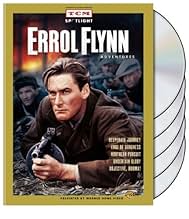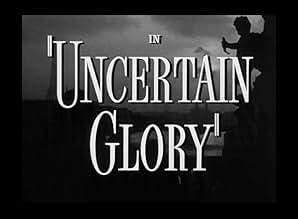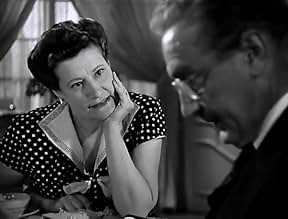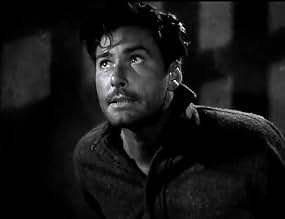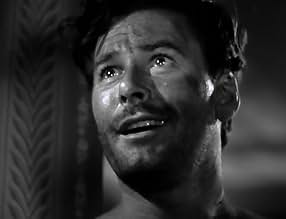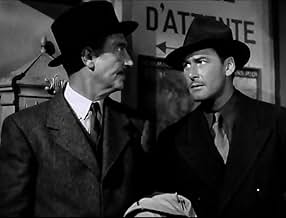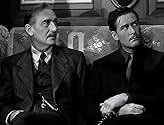IMDb RATING
7.1/10
1.6K
YOUR RATING
After a career criminal is recaptured and knows he faces the guillotine, he offers to exchange his life for 100 hostages slated for execution by the Germans.After a career criminal is recaptured and knows he faces the guillotine, he offers to exchange his life for 100 hostages slated for execution by the Germans.After a career criminal is recaptured and knows he faces the guillotine, he offers to exchange his life for 100 hostages slated for execution by the Germans.
Douglass Dumbrille
- Police Commissioner LaFarge
- (as Douglas Dumbrille)
Felix Basch
- Gestapo Major
- (uncredited)
Frederic Brunn
- German Soldier Reporting to Major
- (uncredited)
Nora Bush
- Townswoman
- (uncredited)
James Carlisle
- Townsman
- (uncredited)
Wallis Clark
- Razeau
- (uncredited)
Pedro de Cordoba
- Executioner
- (uncredited)
Fred Cordova
- Execution Guard
- (uncredited)
Featured reviews
Uncertain Glory (1944)
A rather good war drama, a bit pre-packaged but very well done, as pretty much all Warner Bros films were from this era. Errol Flynn was at a point in his career when he wanted to become a "leading man" in the broader sense, not just a sword-fighting (and handsome) daredevil.
Key to the movie is the quasi-propaganda quality of the movie, set and made during World War II. That's not a bad thing—it's not government propaganda at all, but simply rooting for the good guys, and putting the French (our allies) in a good light (which they deserve).
The plot twist is simple and comes out early, so this gives nothing away—Flynn is a petty criminal who killed someone in a moment of panic, almost by accident, and he's about to have his head chopped off. But then an opportunity (dramatically and beautifully done) suggests a different way to die: for the Cause. The question is whether he can follow through, or whether he'll follow his new romantic (and idealized) love interest to a free new life.
It's all rather good even if contained in movie expectations. The police detective who is guarding and helping Flynn's character is a stalwart of the period, Paul Lukas, and he adds a needed level of gravity and even complexity to the interactions. Flynn is a cheerful presence—very American (even though he's from Tasmania!)—but he often responds rather than leads his scenes. The third lead is the woman, played with wonderful honesty by Faye Emerson.
Part of enjoying these WWII movies is knowing their context, and getting how the audience was wild for a sense of the war, of knowing who was winning, and of sensing how the scene worked, what the French were really like, what the chances were for a soldier caught up in it all. Their brother, their son. And that's kind of what this movie is about, showing heroism, and goodness, and how the war is a just cause and the Nazis are truly horrible (they were). Flynn does what he needs to do here, and if there is artifice and some lack of total believability, that's almost necessary so that a safe distance and cushion is in place.
Not an essential movie, but a really good one, especially if you already like this kind of film and this era.
A rather good war drama, a bit pre-packaged but very well done, as pretty much all Warner Bros films were from this era. Errol Flynn was at a point in his career when he wanted to become a "leading man" in the broader sense, not just a sword-fighting (and handsome) daredevil.
Key to the movie is the quasi-propaganda quality of the movie, set and made during World War II. That's not a bad thing—it's not government propaganda at all, but simply rooting for the good guys, and putting the French (our allies) in a good light (which they deserve).
The plot twist is simple and comes out early, so this gives nothing away—Flynn is a petty criminal who killed someone in a moment of panic, almost by accident, and he's about to have his head chopped off. But then an opportunity (dramatically and beautifully done) suggests a different way to die: for the Cause. The question is whether he can follow through, or whether he'll follow his new romantic (and idealized) love interest to a free new life.
It's all rather good even if contained in movie expectations. The police detective who is guarding and helping Flynn's character is a stalwart of the period, Paul Lukas, and he adds a needed level of gravity and even complexity to the interactions. Flynn is a cheerful presence—very American (even though he's from Tasmania!)—but he often responds rather than leads his scenes. The third lead is the woman, played with wonderful honesty by Faye Emerson.
Part of enjoying these WWII movies is knowing their context, and getting how the audience was wild for a sense of the war, of knowing who was winning, and of sensing how the scene worked, what the French were really like, what the chances were for a soldier caught up in it all. Their brother, their son. And that's kind of what this movie is about, showing heroism, and goodness, and how the war is a just cause and the Nazis are truly horrible (they were). Flynn does what he needs to do here, and if there is artifice and some lack of total believability, that's almost necessary so that a safe distance and cushion is in place.
Not an essential movie, but a really good one, especially if you already like this kind of film and this era.
Errol Flynn is headed for "Uncertain Glory" in this 1944 film also starring Paul Lukas, Faye Emerson, Lucille Watson, Sheldon Leonard, and Jean Sullivan.
The premise is similar to 1943's "Hangmen Also Die!" in one way - the Nazis have taken hostages who will die unless a saboteur is found. In this case, it's the saboteur who blew up a French bridge and killed Germans. Nazis have taken many men as hostages from a small nearby village.
Parallel to this, an Inspector Bonet (Lukas) has finally tracked down a fugitive convicted of murder, Jean Picard (Flynn) who has slipped through France's fingers time and time again - the last time, just as he was about to get the guillotine, the site was bombed, and he escaped.
A friend (Leonard) puts Bonet on his trail, and he's eventually caught. En route to another bout with the guillotine, Picard suggests that he'd rather die by firing squad - can't the Inspector say he is the saboteur, save the 100 men, and Picard can still meet his death?
After some thought, Bonet agrees. Giving out a report of Picard's death, the name Dupont is given to Picard, someone on whom the Nazis cannot check. The real saboteur, whom they help escape, gives them the critical details - one especially important one - to tell the Nazis.
Raoul Walsh directed this film, which is sluggish at times and obviously just cranked out by Warners - probably one of those ones where Jack Warner whined to Walsh, you have to direct this movie for me. Walsh: Who's in it? Warner: Oh, I don't know. Some bum. Just do it. According to Walsh, this type of thing went on all the time.
It's actually a good story that with a little more in the way of production values could have been excellent.
Paul Lukas is wonderful as a gruff, honest inspector whose patriotism overcomes his honesty and who has bonded with this criminal in spite of himself even though he doesn't trust him and doesn't like him.
Flynn does very well in his part - despite Jean's earnest sincerity, you know he wants nothing more than to get away from Bonet as soon as possible, and this whole thing is an elaborate ploy. But he has Bonet half-believing him.
Lucille Watson plays a tough woman whose son is one of the hostages and who goes against the village priest to frame someone as the saboteur so her son can be freed.
One of the comments on this site complained about the French people speaking English. I repeat the theatrical rule: when citizens of a country are depicted in their country in a film or play, they would be speaking their own language, not English with a French accent. Therefore, no accent is necessary, Lucille Watson in this movie being the purest example of this.
Flynn and Lucas have accents, of course - one just has to pretend they came from different parts of France.
All in all, the two stars make the film worthwhile.
The premise is similar to 1943's "Hangmen Also Die!" in one way - the Nazis have taken hostages who will die unless a saboteur is found. In this case, it's the saboteur who blew up a French bridge and killed Germans. Nazis have taken many men as hostages from a small nearby village.
Parallel to this, an Inspector Bonet (Lukas) has finally tracked down a fugitive convicted of murder, Jean Picard (Flynn) who has slipped through France's fingers time and time again - the last time, just as he was about to get the guillotine, the site was bombed, and he escaped.
A friend (Leonard) puts Bonet on his trail, and he's eventually caught. En route to another bout with the guillotine, Picard suggests that he'd rather die by firing squad - can't the Inspector say he is the saboteur, save the 100 men, and Picard can still meet his death?
After some thought, Bonet agrees. Giving out a report of Picard's death, the name Dupont is given to Picard, someone on whom the Nazis cannot check. The real saboteur, whom they help escape, gives them the critical details - one especially important one - to tell the Nazis.
Raoul Walsh directed this film, which is sluggish at times and obviously just cranked out by Warners - probably one of those ones where Jack Warner whined to Walsh, you have to direct this movie for me. Walsh: Who's in it? Warner: Oh, I don't know. Some bum. Just do it. According to Walsh, this type of thing went on all the time.
It's actually a good story that with a little more in the way of production values could have been excellent.
Paul Lukas is wonderful as a gruff, honest inspector whose patriotism overcomes his honesty and who has bonded with this criminal in spite of himself even though he doesn't trust him and doesn't like him.
Flynn does very well in his part - despite Jean's earnest sincerity, you know he wants nothing more than to get away from Bonet as soon as possible, and this whole thing is an elaborate ploy. But he has Bonet half-believing him.
Lucille Watson plays a tough woman whose son is one of the hostages and who goes against the village priest to frame someone as the saboteur so her son can be freed.
One of the comments on this site complained about the French people speaking English. I repeat the theatrical rule: when citizens of a country are depicted in their country in a film or play, they would be speaking their own language, not English with a French accent. Therefore, no accent is necessary, Lucille Watson in this movie being the purest example of this.
Flynn and Lucas have accents, of course - one just has to pretend they came from different parts of France.
All in all, the two stars make the film worthwhile.
The story takes place in Poitou in the Gartempe Valley.A really nice valley ,but which does not look like the one depicted in the film.THe river is actually hemmed in by steep banks .And how strange to hear people from la Vienne department -who have a marked accent - speak English! Geographically and historically ,this is a deeply inaccurate movie.Without any paper ,Picard can travel without any problem from the small village near Poitiers to Paris .Made in 1944,it was ,like so many others ,a propaganda movie ("La Marseillaise" can be heard at the end of Walsh's work.) Forget the background and you have an absorbing movie,the subject of which is still relevant today.Flynn portrays Picard a sentenced-to-death man,who,on his way to the guillotine ,is saved by the gong (He will say later: "the only help I got from the sky was bombs").But a Javertesque cop (Lukas) is hot on his heels and he arrests him again.
A saboteur blew up a bridge over La Gartempe .The reprisals are terrible:if the "criminal" does not surrender by Tuesday ,one hundred French hostages will be shot.Picard suggests a deal to the cop "I 'd rather be shot than put my head in the guillotine ;so let's make a deal: I 'll tell the Gestapo I'm the saboteur and a hundred lives will be spared.But give me three days just to live..." These three days will be full of unexpected twists,of treason,of nasty tricks (the inhabitants of the village trying to find a scapegoat:"you are inspired by the devil" says the priest;the old lady suggesting an old man he give him up cause he 's got no family) ,of moments of happiness (Picard finds love with the gorgeous Louise -a brunette,Lucile Watson ,who I first mistook for Jennifer Jones-) ,but also of doubt and fear.Interest is sustained till the very last pictures.Flynn gives a mature performance ,far from his dashing usual heroes.Excellent supporting cast.
"Uncertain Glory" might have influenced Henri Jeanson and Christian-Jaque when they made their underrated " Le Repas des Fauves" (1964).
A saboteur blew up a bridge over La Gartempe .The reprisals are terrible:if the "criminal" does not surrender by Tuesday ,one hundred French hostages will be shot.Picard suggests a deal to the cop "I 'd rather be shot than put my head in the guillotine ;so let's make a deal: I 'll tell the Gestapo I'm the saboteur and a hundred lives will be spared.But give me three days just to live..." These three days will be full of unexpected twists,of treason,of nasty tricks (the inhabitants of the village trying to find a scapegoat:"you are inspired by the devil" says the priest;the old lady suggesting an old man he give him up cause he 's got no family) ,of moments of happiness (Picard finds love with the gorgeous Louise -a brunette,Lucile Watson ,who I first mistook for Jennifer Jones-) ,but also of doubt and fear.Interest is sustained till the very last pictures.Flynn gives a mature performance ,far from his dashing usual heroes.Excellent supporting cast.
"Uncertain Glory" might have influenced Henri Jeanson and Christian-Jaque when they made their underrated " Le Repas des Fauves" (1964).
Right after Flynn's rape trial Warner put him in "quickie" inexpensive films not knowing how the public would respond to Flynn films. Uncertain Glory was one of them. Most reviewers of the time panned the film as a minor Flynn vehicle and heroic Flynn nonsense. However, as time has passed some modern day reviewers have re-evaluted this film and some have commented that Flynn gives a really good performance in a pretty darn good cat and mouse drama. And I totally agree. The story is interesting and the interplay between Flynn and Oscar-winning(The Watch on the Rhine) Paul Lukas is terrific. I think this is maybe Flynn's most underrated film. Whenever I watch it I imagine by Flynn's character the ending could have gone quite different and been more unpredictable but knowing the times(1944) and still in the midst of WWII the ending had to be what it was... Patriotic. Again, I think "Uncertain Glory" is a very underrated Flynn movie. *** of **** rating...easy.
Despite being quite a fan of Errol Flynn's, I had somehow managed to go forty years without seeing this movie, largely on the basis of its poor critical reputation. I always loved Flynn's swashbuckling, his insouciance, and especially his poignant performances near the end of his career in "The Sun Also Rises," "The Roots of Heaven," and "Too Much, Too Soon." I expected nothing from "Uncertain Glory," but a clip in a recent Flynn documentary caught my eye with what seemed to be a quite real and touching performance. I finally saw the film tonight and was impressed far beyond expectations. Flynn always harbored a hope of being respected as a dramatic actor, and though I think he achieved that in the previously mentioned later films, I was surprised to find in this 1944 performance a richness and texture every bit the equal of his best dramatic work. The film itself has, like most American movies of its period, certain conventions and unrealities which must be accepted (such as the variance in accents and some melodramatic plot devices), but it seemed to me to be quite believable and realistic within those confines. I was impressed by Paul Lukas, never a favorite of mine in particular, and the story kept me quite involved. Elements of it were quite moving. But Flynn quite simply overwhelmed my every expectation, and I suggest that this film might actually be reconsidered and included among the best pictures of his career. It's certainly one of his best performances.
Did you know
- TriviaErrol Flynn was criticized for playing heroes in World War II movies. Tony Thomas in his book 'Errol Flynn: The Spy Who Never Was' states that Flynn had tried to enlist in every branch of any armed services he could but was rejected as unfit for service on the grounds of his health. He had a heart condition, tuberculosis, malaria and a back problem. Flynn felt he could contribute to America's war effort by appearing in such films as L'ange des ténèbres (1943); Du sang sur la neige (1943); Bombardiers en piqué (1941), Aventures en Birmanie (1945) and Saboteur sans gloire (1944). Reportedly, Flynn was at his most professional and co-operative he ever was whilst working on Second World War movies. The studios apparently did not diffuse the criticism of Flynn's state-of-health as they wished to keep it quiet for fear of his box-office draw waning.
- GoofsAbout 1:20 into the film, there is a scene where the French police are coming into the town at night. One, on a motorcycle, rounding a corner, seemingly slips on the wet cobblestones and crashes in front of the camera - the shadow of his head flashes across the bottom of the screen and the sound of his presumed crash can be heard.
- Quotes
Jean Picard: [indignantly to the barber just before he is to be sent to face the guillotine] My head comes off as it is!
- ConnectionsFeatured in The Adventures of Errol Flynn (2005)
- SoundtracksLa Marseillaise
(1792) (uncredited)
Music by Claude Joseph Rouget de Lisle
Variations in the score often
- How long is Uncertain Glory?Powered by Alexa
Details
- Release date
- Country of origin
- Languages
- Also known as
- Uncertain Glory
- Filming locations
- Escondido, California, USA(vineyard scenes)
- Production company
- See more company credits at IMDbPro
- Runtime
- 1h 42m(102 min)
- Color
- Aspect ratio
- 1.37 : 1
Contribute to this page
Suggest an edit or add missing content


